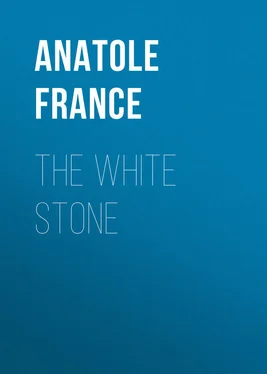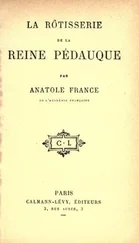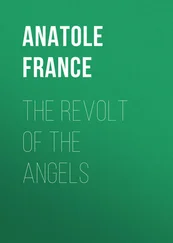Anatole France - The White Stone
Здесь есть возможность читать онлайн «Anatole France - The White Stone» — ознакомительный отрывок электронной книги совершенно бесплатно, а после прочтения отрывка купить полную версию. В некоторых случаях можно слушать аудио, скачать через торрент в формате fb2 и присутствует краткое содержание. Жанр: foreign_antique, foreign_prose, на английском языке. Описание произведения, (предисловие) а так же отзывы посетителей доступны на портале библиотеки ЛибКат.
- Название:The White Stone
- Автор:
- Жанр:
- Год:неизвестен
- ISBN:нет данных
- Рейтинг книги:4 / 5. Голосов: 1
-
Избранное:Добавить в избранное
- Отзывы:
-
Ваша оценка:
- 80
- 1
- 2
- 3
- 4
- 5
The White Stone: краткое содержание, описание и аннотация
Предлагаем к чтению аннотацию, описание, краткое содержание или предисловие (зависит от того, что написал сам автор книги «The White Stone»). Если вы не нашли необходимую информацию о книге — напишите в комментариях, мы постараемся отыскать её.
The White Stone — читать онлайн ознакомительный отрывок
Ниже представлен текст книги, разбитый по страницам. Система сохранения места последней прочитанной страницы, позволяет с удобством читать онлайн бесплатно книгу «The White Stone», без необходимости каждый раз заново искать на чём Вы остановились. Поставьте закладку, и сможете в любой момент перейти на страницу, на которой закончили чтение.
Интервал:
Закладка:
“God is the soul of the world; this soul spreads to all parts of the universe, infusing motion and life into it. This soul, a creative flame, penetrating the inert mass of matter, gave shape to the world, governing and preserving it. Divinity, an active force, is essentially good. The matter which it has put to good use, being inert and passive, is bad in certain of its parts. God has been powerless to change its nature. This explains the origin of the evil in the world. Our souls are particles of the divine fire into which they will some day be merged. Consequently, God is within us and he dwells in particular in the virtuous man whose soul is not hampered with gross materialism. This wise man, in whom God dwells, is God’s equal. He should not implore him, but contain him within himself. And what madness it is to pray to God! What an act of impiety it is to petition him! It is tantamount to believing that it is possible to enlighten his intelligence, to change his heart, and to persuade him to mend his behaviour. It is displaying ignorance of the necessity governing his immutable wisdom. He is subjected to Destiny, or, to be more accurate, he is Destiny. His ways are laws to which he is like ourselves subjected. For once that he commands, he obeys for ever. Free and powerful in his submission, it is to himself that he shows obedience. All the happenings in the world are the manifestations of sovereign intentions originating with himself. His helplessness against himself is infinite.”
Gallio’s speech was applauded by his hearers. Apollodorus, however, craved permission to submit a few objections.
“You are right, Gallio,” he said, “when you believe that Jupiter is at the mercy of Anankè and I hold with you that Anankè is the first among the immortal goddesses. But it appears to me that your god, above all admirable in his compass and his perpetuity, had better intentions than luck when he created the world, since he found nothing better wherewith to knead it than a rebellious and ingrate substance, and that the material betrays the workman. I cannot but feel for him over his discomfiture. The potters of Athens are more fortunate. They procure, for the purpose of making vases, a delicate and plastic clay which readily takes and preserves the contours they give it. Hence do their goblets and amphoræ present an agreeable form. Their curves are graceful, and the painter limns with ease figures pleasing to the eye, such as old Silenus bestriding his ass, the toilet of Aphrodite, and the chaste Amazons. When I come to think of it, Gallio, I am of the opinion that if your god was less fortunate than the potters of Athens, ’tis for the reason that he lacked wisdom and that he was a poor artisan. The material at his disposal was not of the best. Still, it was not devoid of all serviceable properties, as you have yourself confessed. Nothing is absolutely good or absolutely bad. A thing may be bad if put to a certain use, while it may be excellent in some other. It would be waste of time to plant olive-trees in the clay used in fashioning amphoræ. The tree of Pallas would not grow in the light and pure soil of which are made the beautiful vases which our victorious athletes receive, blushing the while with pride and modesty. It seems to me, Gallio, that your god, when fashioning the world with a material that was not suitable for the undertaking, was guilty of the mistake which a vine-dresser of Megara would be committing, were he to plant a vine in modelling clay, or were some worker in ceramics to select for the making of amphoræ the stony soil which affords nutriment to the clusters of the grape-vine. Your god, you say, made the universe. He ought certainly to have given form to some other thing, in order to make suitable use of his material. Since the substance, as you assert, proved rebellious to him, either through its inherent inertia, or through some other bad quality, should he have persisted in putting it to a use it could not respond to, and, as the saying goes, carve his bow out of a cypress? The secret of industry does not consist in accomplishing much, but in doing good work. Why did he not content himself with creating some small thing, say a gnat, or a drop of water, but finish it to perfection?
“I might add further remarks about your god, Gallio, and ask you, for instance, if you do not entertain a fear that from his constant rubbing against matter, he may wear out, just as a millstone becomes worn in the long run in the course of grinding wheat. But such questions are not to be solved in a hurry, and the time of a proconsul is precious. Permit me at least to say to you that you are not justified in believing that your god rules and preserves the world, since, according to your own admission, he deprived himself of intelligence after having become acquainted with all things; of will-power, after having willed all things, and of power, following upon his ability to do what he saw fit. Herein again lay, on his part, a serious mistake, for he was thus an instrument in depriving himself of the means of correcting his imperfect work. So far as I am concerned, I am inclined to believe that god is in reality, not the one you have conceived, but indeed the matter he discovered on a certain day, and which the Greeks have styled chaos. You are mistaken in your belief that matter is inert. It is ever in motion, and its perpetual activity keeps life a-going throughout the universe.”
Thus spake the philosopher Apollodorus. Gallio, who had listened to his speech with some degree of impatience, denied that he had fallen a victim to the mistakes and contradictions with which the Greek charged him. But he failed in refuting successfully the arguments of his opponent, as his intellect was not a subtle one and because he demanded principally of philosophy the means of rendering men virtuous, and because he was interested in useful truths only.
“Try to grasp, Apollodorus,” he said, “that God is none other than nature. Nature and himself are one. God and Nature are the two names of a single being, just as Novatus and Gallio designate one and the same man. God, if you prefer, is divine reason commingling with the earth. You need have no fear that he will wear out through this amalgamation, since his tenuous substance participates of the fire which consumes all matter while remaining unchanged.
“But should, nevertheless,” proceeded Gallio, “my doctrine embrace ill-assorted ideas, do not blame me for it, my dear Apollodorus, but rather give me praise because I suffer a few contradictions to find a place in my mind. Were I not conciliatory as regards my own ideas, were I to confer upon a single system an exclusive preference, I could no longer tolerate the freedom of every opinion; having destroyed my own freedom of thought, I could not readily tolerate it in the case of others, and I should forfeit the respect due to every doctrine established or professed by a sincere man. The gods forbid that I should see my opinion prevail to the exclusion of any other, and exercise an absolute sway on other minds. Conjure up a picture, my dear friends, of the state of manners and morals, were a sufficient number of men firmly to believe that they were the sole possessors of the truth, if, by some impossible chance, they were thoroughly agreed as to that truth. A too narrow piety among the Athenians, who are nevertheless full of wisdom and of doubt, was the cause of the banishment of Anaxagoras and of the death of Socrates. What would happen were millions of men enslaved by one solitary idea concerning the nature of the gods? The genius of the Greeks and the prudence of our ancestors made allowance for doubt, and tolerated the worship of Jupiter under several names. No sooner should a powerful sect come on this ailing earth and proclaim that Jupiter has one name only, than blood would flow the world over, and no longer would there be but one Caius whose madness should threaten the human race with death. All the men of such a sect would be so many Caiuses. They would face death for a name. For a name, they would kill, since it is rather in the nature of men to kill than to die on behalf of what seems to them true and most excellent. Hence it is better to base public order on the diversity of opinions, than to seek to establish it on a universal consent to one and the same belief. A like unanimous consent could never be realised, and in seeking to obtain it, men would become stupid and maddened. For, indeed, the most patent truth is but a vain jangle of words to the men on whom it is attempted to impose it. You would compel me to believe a thing which you understand, but which passes my understanding. You would thus be forcing upon me not a thing that is intelligible, but one that is incomprehensible. And I am nearer you when holding a different belief, one which I understand. For, in that case, both of us are making use of our reason, and we both possess an intelligent comprehension of our own belief.”
Читать дальшеИнтервал:
Закладка:
Похожие книги на «The White Stone»
Представляем Вашему вниманию похожие книги на «The White Stone» списком для выбора. Мы отобрали схожую по названию и смыслу литературу в надежде предоставить читателям больше вариантов отыскать новые, интересные, ещё непрочитанные произведения.
Обсуждение, отзывы о книге «The White Stone» и просто собственные мнения читателей. Оставьте ваши комментарии, напишите, что Вы думаете о произведении, его смысле или главных героях. Укажите что конкретно понравилось, а что нет, и почему Вы так считаете.










